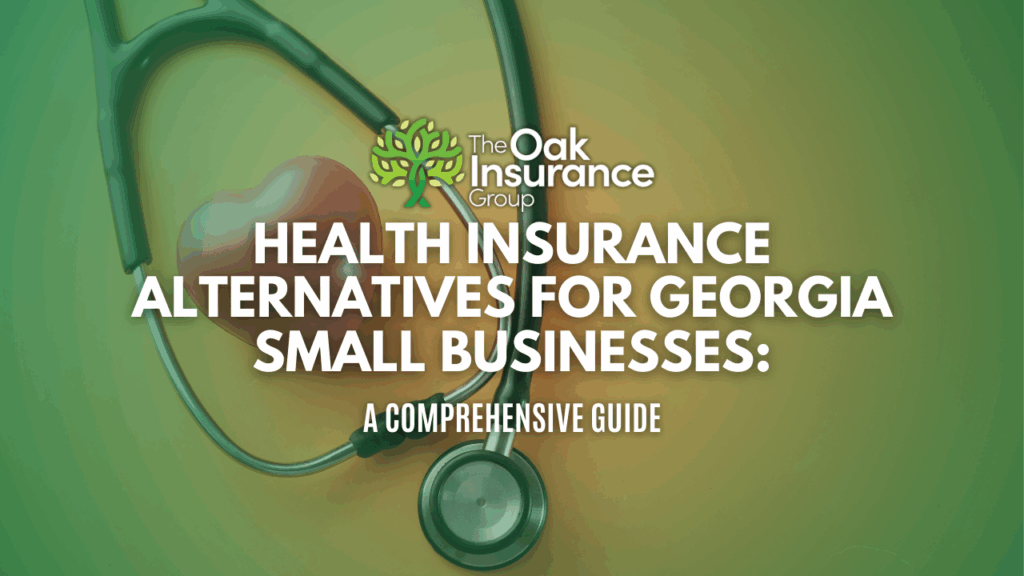
Feeling overwhelmed by skyrocketing health insurance premiums for your small business?
Wondering if there are better, more flexible options to support your team without breaking the bank?
You’re not alone—and the good news is that alternatives do exist.
In this guide, you’ll discover flexible, cost-effective health benefit solutions beyond traditional group plans. Whether you’re struggling with affordability, limited coverage options, or simply want more control, this article will show you how to:
- Navigate tax-advantaged reimbursement strategies like ICHRAs and Cafeteria Plans
- Leverage innovative alternatives like Health Sharing Plans and Direct Primary Care
- Understand association-based and level-funded plans built for small employers
- Strategically combine multiple solutions for maximum impact and affordability
Let’s dive into the best health insurance alternatives Georgia small businesses should consider.
Tax-Advantaged Health Reimbursement Options
Health Reimbursement Arrangements (HRAs) are one of the most flexible and tax-efficient tools available to Georgia small businesses. Specifically, the Individual Coverage Health Reimbursement Arrangement (ICHRA) allows employers to reimburse employees tax-free for individual health insurance and medical expenses.
Why Georgia businesses should pay attention:
The state now offers ICHRA-specific tax incentives—a $600 per-employee annual credit for the first three years for businesses with 10 or fewer employees. That’s a potential $18,000 in savings for a company with 10 staff members over three years.
Bold Insight: ICHRAs turn your health benefits from a fixed group plan into a scalable, customizable budget.
Community-Based Alternatives: Health Sharing Plans
Health Sharing Plans operate outside the bounds of traditional insurance. Instead of paying premiums to an insurer, members contribute to a shared fund that covers each other’s medical needs.
Key pros:
- Cost savings: Georgia small businesses may save over $10,000 per employee annually for family coverage.
- Simple model: Contributions are often lower than insurance premiums.
Key cons:
- Not insurance: Health sharing plans don’t cover pre-existing conditions or guarantee coverage.
- Compliance risks: These plans don’t meet ACA standards.
Best fit: Budget-conscious employers with a healthy workforce looking for a low-cost alternative.
Eliminate the Middleman with Direct Primary Care (DPC)
Direct Primary Care (DPC) cuts out insurance altogether. Instead, businesses pay a flat monthly fee to a physician or clinic for unlimited access to primary care services.
Benefits of DPC in Georgia:
- Same-day or next-day appointments
- Extended visit times
- Unlimited in-office care for one low monthly fee
DPC is often paired with catastrophic coverage or health sharing to round out care.
Bold Insight: DPC restores the doctor-patient relationship and dramatically lowers out-of-pocket costs.
Association and Group Solutions
Georgia Chamber SMART Plan
The SMART Plan, offered through the Georgia Chamber of Commerce and powered by Anthem Blue Cross Blue Shield, is a Multiple Employer Welfare Arrangement (MEWA).
It currently covers over 50,000 lives and is available to businesses with 2–50 employees. Key features include:
- Competitive group rates
- Shared claims risk among members
- Must be a Georgia Chamber member to participate
Bold Insight: This is one of Georgia’s most robust small business group options.
Level-Funded Plans
Level-funded plans blend the predictability of fully insured plans with the savings potential of self-funded models.
Highlights:
- Available to groups as small as 2–5 employees
- Savings of up to 20% over traditional plans
- Year-end refunds for about 50% of participating businesses
- Includes stop-loss protection to cap risk
Best for: Employers who want group coverage flexibility without full self-insurance risk.
Maximize Tax Benefits and Stay Compliant
Beyond plan selection, small businesses in Georgia can increase value through smart tax strategies:
- Section 125 Cafeteria Plans: Allow employees to pay for premiums with pre-tax dollars, reducing tax burdens for both employees and employers.
- Small Business Health Care Tax Credit: Offers up to 50% reimbursement of premiums for businesses with <25 employees and average wages under $53,000.
Bold Insight: These savings can significantly offset the cost of offering health benefits.
Understand the True Cost of Traditional Health Insurance
Here’s why many small businesses are seeking alternatives:
- 341% increase in family premiums from 1999 to 2024
- $25,572/year average annual cost for family coverage
- In Georgia, employers pay $580/month for single and $707/month for family coverage on average
- In many Georgia counties, individual health insurance is cheaper than group plans, making ICHRA pairing highly attractive
Bold Insight: Traditional insurance is increasingly unsustainable for small employers.
Combine Strategies for Best Results
The smartest Georgia employers are blending solutions to create customized health benefit strategies.
Example combinations:
- Direct Primary Care + Health Sharing Plan
- ICHRA + Critical Illness + Health Savings Accounts (HSAs)
- SMART Plan + Level-Funded Vision and Dental
Your choices should reflect:
- Workforce demographics
- Budget constraints
- Risk tolerance
- Administrative bandwidth
Bold Insight: Strategic bundling delivers comprehensive care and cost control.
Final Thoughts: How to Choose the Right Path Forward
After navigating rising healthcare costs and restrictive group plans, Georgia small business owners now have a wider range of alternatives than ever before.
By leveraging state ICHRA incentives, innovative options like DPC and health sharing, and proven group solutions like the SMART Plan, you can build a benefits package that attracts talent and protects your bottom line.
At the end of the day, your employees deserve access to care—and you deserve options that work for your business.
Now that you’ve learned about the full menu of health insurance alternatives, your next step is to speak with a licensed benefits advisor familiar with Georgia’s regulations. They can help tailor a strategy that fits your unique needs.

